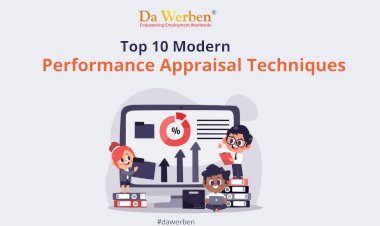Top Candidate Types: Find Out Which One You Are
Whether you're a job seeker trying to understand your own strengths or a recruiter aiming to showcase the best candidates, this guide provides valuable insights into categorizing and presenting talent effectively.Join us as we break down the top candidate types and offer tips on how to leverage these categories to meet the needs of both job seekers and employers. Find out where you fit in the spectrum of candidate types and learn how to position yourself or your candidates for the best possible outcome.
When categorizing candidates in recruitment, there are several informal and formal labels recruiters use to describe a candidate’s availability, skills, and interest. These labels help to better target job opportunities and manage expectations. Here are some of the most common types:
1. Active Candidate
- Definition: Actively seeking new employment.
- Characteristics:
- Applying to job boards and reaching out to recruiters.
- May have recently left a job or is unhappy in their current role.
- More accessible and easy to engage.
2. Passive Candidate
- Definition: Not actively looking for a new job but open to hearing about opportunities.
- Characteristics:
- Currently employed, usually satisfied with their position.
- May consider switching if a better opportunity arises.
- Often approached through networking, LinkedIn, or headhunting.
3. Purple Squirrel
- Definition: The ideal, often seemingly impossible-to-find candidate.
- Characteristics:
- Possesses an almost perfect combination of skills, qualifications, and experience.
- Extremely hard to find due to the specificity of the required skillset.
- Often in high demand and likely to command a premium salary.
4. Silver Medalist
- Definition: A candidate who made it to the final stages of a hiring process but did not get selected.
- Characteristics:
- Strong enough to be considered for future roles.
- Usually ranked just behind the hired candidate.
- A good pool to tap into when a similar position opens up.
5. Active Job Seeker
- Definition: Actively applying for jobs and attending interviews.
- Characteristics:
- Frequently updated profiles on job boards.
- May be flexible in salary or job type depending on urgency.
- Possibly unemployed or underemployed.
6. Boomerang Employee
- Definition: A candidate who has left a company but is later rehired.
- Characteristics:
- Familiar with the company’s culture and expectations.
- Brings back valuable experience gained elsewhere.
- May require less onboarding and training.
7. Reach Candidate
- Definition: A candidate who has more qualifications or experience than required.
- Characteristics:
- May be overqualified for the position.
- Could command a higher salary.
- Typically approached for leadership roles or special projects.
8. Under-the-Radar Candidate
- Definition: A highly qualified candidate not visible on mainstream job platforms.
- Characteristics:
- May be found through networking or specialized channels.
- Could be a top performer in a niche field.
- Usually passive and needs to be headhunted.
9. High-Potential Candidate
- Definition: A candidate with a lot of promise but may lack experience in some areas.
- Characteristics:
- Demonstrates the ability to grow into a role.
- May require some training and development.
- Often younger or early in their career.
10. In Transition
- Definition: A candidate between jobs or careers.
- Characteristics:
- Could be someone who recently resigned, was laid off, or is pivoting to a new career.
- Actively exploring new opportunities but may need reskilling.
- May be open to contract work, freelancing, or consulting during their transition period.
11. Consultant/Contractor
- Definition: Looking for temporary, project-based, or contract roles.
- Characteristics:
- Prefers flexible work arrangements.
- Often highly skilled and specialized in specific areas.
- Typically not looking for permanent employment.
12. Leaky Bucket Candidate
- Definition: A candidate who may look promising initially but is not stable or long-term focused.
- Characteristics:
- Could have a history of short-term roles or frequent job changes.
- May not be a good cultural fit for long-term retention.
- Could be considered for temporary or high-turnover roles.
13. Superstar Candidate
- Definition: Top talent with a proven track record of exceptional performance.
- Characteristics:
- Frequently pursued by recruiters and companies.
- Likely to have multiple offers and expect premium compensation.
- Ideal for leadership roles or high-impact positions.
14. Non-Traditional Candidate
- Definition: A candidate with a career path or background that is unconventional for the role.
- Characteristics:
- May come from a different industry, education background, or have transferable skills.
- Often brings unique perspectives or a diverse skill set.
- Typically requires more creative assessment from recruiters.
15. Rebounding Candidate
- Definition: Recently left or lost their job (e.g., layoffs, downsizing).
- Characteristics:
- Actively looking but may not have updated resumes or profiles.
- Could be highly motivated and open to different types of opportunities.
- Often willing to negotiate salary and benefits.
16. Job Hopper
- Definition: A candidate with a pattern of changing jobs frequently, often within a year or two.
- Characteristics:
- Seen as a risk for long-term retention but may have gained diverse experience.
- Likely to be interested in fast-paced environments or contract roles.
- Can be a good fit for industries where flexibility and change are valued.
17. Career Changer
- Definition: A candidate shifting into a new industry or role significantly different from their previous experience.
- Characteristics:
- May lack specific experience in the desired role but brings transferable skills.
- Highly motivated to learn and adapt.
- Typically requires more training or support in the transition phase.
18. Diversity Hire
- Definition: A candidate prioritized to promote diversity within an organization.
- Characteristics:
- Brings diverse perspectives and experiences.
- Often sought after in industries focused on improving inclusion.
- Can play a critical role in fostering innovation and broadening the organizational culture.
19. Returnship Candidate
- Definition: A candidate returning to the workforce after a prolonged career break (e.g., parental leave, caregiving, or sabbatical).
- Characteristics:
- Often highly qualified but may need re-skilling or updating on industry trends.
- Motivated to re-establish their career, often open to flexible working arrangements.
- Companies may offer returnship programs as a pathway to full-time employment.
20. Rising Star
- Definition: A high-potential candidate who is quickly advancing in their career and expected to reach leadership positions.
- Characteristics:
- Demonstrates strong leadership and achievement in a relatively short time.
- Likely to seek roles that provide growth opportunities.
- Typically in demand for leadership development or succession planning programs.
21. Gig Worker
- Definition: A candidate who prefers short-term, project-based, or freelance work rather than full-time employment.
- Characteristics:
- Enjoys flexibility and working on varied projects.
- Can be highly skilled in a niche area.
- May not be looking for permanent roles but could be useful for specific, time-bound needs.
22. Intrapreneur Candidate
- Definition: A candidate who acts entrepreneurially within an organization, driving innovation and new initiatives.
- Characteristics:
- Thrives in dynamic, fast-paced environments.
- Often interested in roles where they can have a major impact.
- May prefer roles in startups or innovative departments within larger companies.
23. Pipelined Candidate
- Definition: A candidate who has been identified for future opportunities but may not be a perfect match for the current role.
- Characteristics:
- Strong potential to be hired for upcoming roles.
- Often maintained in a recruitment pipeline for future engagement.
- May have been previously interviewed or referred by others.
24. Bridge Candidate
- Definition: A senior professional nearing retirement who is willing to take on short-term or mentoring roles.
- Characteristics:
- Often possesses extensive experience and a deep understanding of the industry.
- Ideal for knowledge transfer and mentoring younger employees.
- Typically interested in contract or advisory roles rather than long-term employment.
25. Loyal Candidate
- Definition: A candidate with a history of long tenures at their previous jobs.
- Characteristics:
- Seen as a strong cultural fit for companies that prioritize stability and retention.
- Often deeply invested in the success of their employers.
- Less likely to job-hop, reducing turnover risk.
26. Talent Magnet
- Definition: A candidate who not only has excellent skills but also attracts other high-quality talent to the company.
- Characteristics:
- Known for being a leader or influencer in their field.
- Can help build teams by leveraging their networks.
- Often hired for strategic roles that require leadership beyond just their own position.
27. Remote-First Candidate
- Definition: A candidate who prioritizes remote work and may not be interested in office-based roles.
- Characteristics:
- Skilled in remote collaboration tools and techniques.
- Likely to prioritize companies with flexible work policies.
- Ideal for fully remote roles or companies embracing hybrid working models.
28. Specialist Candidate
- Definition: A candidate with highly specialized skills in a particular field.
- Characteristics:
- May command higher salaries due to niche expertise.
- Often in industries like IT, engineering, or healthcare.
- May require roles where they can leverage their deep, specific knowledge rather than broad skillsets.
29. Emerging Market Candidate
- Definition: A candidate based in or seeking opportunities in emerging or developing markets.
- Characteristics:
- Familiar with local challenges and opportunities.
- Often willing to take on leadership roles in high-growth regions.
- Can be an asset for companies expanding into new markets.
30. Freelancer
- Definition: A candidate who works on a contract basis for multiple companies.
- Characteristics:
- Often highly skilled in their niche.
- Flexible but may not seek long-term commitment.
- Typically interested in project-based work.
31. Bridge Job Candidate
- Definition: A candidate seeking temporary employment between longer-term roles.
- Characteristics:
- May take short-term positions to gain experience or fill gaps.
- Often open to diverse opportunities to stay active in the job market.
- Not looking for a permanent role but willing to help with immediate needs.
32. Returnee Candidate
- Definition: A candidate who is looking to return to a former company after working elsewhere.
- Characteristics:
- Familiar with the company’s culture, reducing onboarding time.
- Brings fresh experience from another organization.
- May have left on good terms and is re-evaluating previous opportunities.
33. Candidate in Transition
- Definition: A candidate who is transitioning from one career phase to another (e.g., from a technical role to management).
- Characteristics:
- May be interested in roles that allow them to leverage both old and new skill sets.
- Typically requires mentorship or guidance in navigating their new phase.
- Often driven by a desire for personal growth or a change in career focus.
34. First-Time Job Seeker
- Definition: A candidate just entering the workforce, often a recent graduate.
- Characteristics:
- Typically lacks experience but is eager to learn.
- Open to entry-level roles or internships.
- May require additional training but can be molded to fit the company’s needs.
Ultimately, whether you are a job seeker aiming to showcase your value or a recruiter presenting profiles, knowing these categories and their implications can enhance the recruitment process, leading to more successful hires and fulfilling career matches. Embrace these insights to position yourself or your candidates more effectively and achieve the best possible outcomes in your hiring efforts.
















